Related Research Articles

Coca-Cola, or Coke, is a cola soft drink manufactured by the Coca-Cola Company. In 2013, Coke products were sold in over 200 countries worldwide, with consumers drinking more than 1.8 billion company beverage servings each day. Coca-Cola ranked No. 94 in the 2024 Fortune 500 list of the largest United States corporations by revenue. Based on Interbrand's "best global brand" study of 2023, Coca-Cola was the world's sixth most valuable brand.

Dhaka, formerly known as Dacca, is the capital and largest city of Bangladesh. It is the ninth-largest and eighth-most densely populated city in the world with a density of 23,234 people per square kilometer within a total area of approximately 300 square kilometers. Dhaka is a megacity, and has a population of 10.2 million residents as of 2024, and a population of over 23.9 million residents in Dhaka Metropolitan Area. It is widely considered to be the most densely populated built-up urban area in the world. Dhaka is the most important cultural, economic, and scientific hub of Eastern South Asia, as well as a major Muslim-majority city. Dhaka ranks third in South Asia and 39th in the world in terms of GDP. Lying on the Ganges Delta, it is bounded by the Buriganga, Turag, Dhaleshwari and Shitalakshya rivers. Dhaka is also the largest Bengali-speaking city in the world.
Syed Nazrul Islam was a Bangladeshi politician and a senior leader of the Awami League. During the Bangladesh Liberation War, he was declared as the Vice President of Bangladesh by the Provisional Government. He served as the Acting President in the absence of Sheikh Mujibur Rahman.

Thums Up is a brand of cola. It was introduced in 1977 to offset the withdrawal of The Coca-Cola Company from India. The brand was later bought by Coca-Cola who re-launched it in order to compete against Pepsi to capture the market.

The Coca-Cola Company is an American multinational corporation founded in 1892. It manufactures, sells and markets soft drinks including Coca-Cola, other non-alcoholic beverage concentrates and syrups, and alcoholic beverages. Its stock is listed on the New York Stock Exchange and is a component of the DJIA and the S&P 500 and S&P 100 indexes.
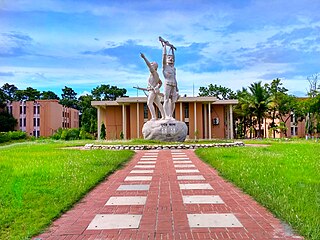
Khulna is the third-largest city in Bangladesh, after Dhaka and Chittagong. It is the administrative center of the Khulna District and the Khulna Division. Khulna's economy is the third-largest in Bangladesh, contributing $53 billion in gross regional domestic product and $95 billion in purchasing power parity (PPP) in 2020. In the 2024 census, the city corporation area had a population of 884,445.
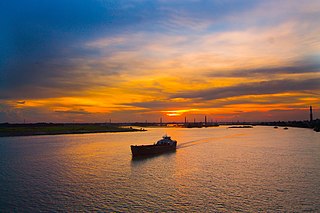
The Buriganga is a river in Bangladesh which flows past the southwest outskirts of the capital city, Dhaka. Its average depth is 7.6 metres (25 ft) and its maximum depth is 18 metres (58 ft). It ranks among the most polluted rivers in the country.

Jessore District, officially spelled Jashore District from April 2018, is a district in southwestern Bangladesh. It is bordered by India to the west, Khulna and Satkhira districts to the south, Khulna and Narail to the east, and Jhenaidah and Magura districts to the north. Jessore is the capital of the district. Jessore is the home of the ancestors of the great Bengali poet Rabindranath Tagore. Jashore was the first independent district of Bangladesh in 1971.
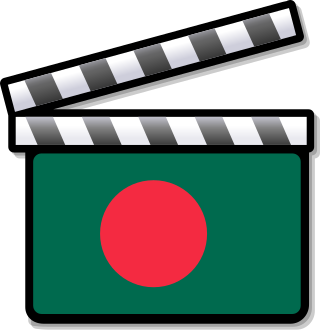
The Cinema of Bangladesh, also known as Bangla cinema, is a diverse and vibrant entity, consisting of films produced across various regions in Bangladesh, each contributing its unique linguistic and cultural perspective. Beyond the dominant Dhaka based Bengali-language film industry Dhallywood, which is a portmanteau of "Dhaka" and "Hollywood", Bangladesh is home to cinema in several other languages and dialects. For instance, Chakma cinema from Bandarban, Garo cinema from Sherpur, Meitei and Sylheti cinema from Sylhet, Chatgaiya cinema from Chattogram. These regional cinemas play a crucial role in preserving and promoting the linguistic and cultural heritage of the country. The dominant style of Bangladeshi cinema is melodramatic cinema, which developed from 1947 to 1990 and characterizes most films to this day. Cinema was introduced in Bangladesh in 1898 by the Bradford Bioscope Company, credited to have arranged the first film release in Bangladesh. Between 1913 and 1914, the first production company, Picture House, was opened. A 1928 short silent film titled Sukumari was the first Bengali-produced film in the region. The first full-length film, The Last Kiss, was released in 1931.
Syed Manzur Elahi is a Bangladeshi businessperson and chairman of Apex group.
Motijheel is a central business district and a thana of Dhaka, Bangladesh. It is Dhaka's primary central business district, and also the nation's largest commercial and financial hub. Motijheel, located immediately adjacent to Dhaka's zero point, has the largest number of offices in Dhaka. Motijheel CBD also has one of the highest concentrations of high-rise buildings in Bangladesh. It has thus earned the title of the downtown and city centre of Dhaka and as the bankpara-officepara in Bengali.
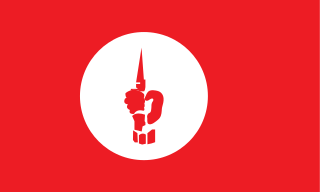
The Mukti Bahini, also known as the Bangladesh Forces, was the guerrilla resistance movement consisting of the Bangladeshi military, paramilitary and civilians during the Bangladesh Liberation War that transformed East Pakistan into Bangladesh in 1971. They were initially called the Mukti Fauj.

The Government agencies in Bangladesh are state controlled organizations that act independently to carry out the policies of the Government of Bangladesh. The Government Ministries are relatively small and merely policy-making organizations, allowed to control agencies by policy decisions. Some of the work of the government is carried out through state enterprises or limited companies.
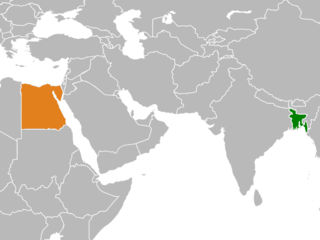
Bangladesh–Egypt relations refer to the bilateral relations between Bangladesh and Egypt. Bangladesh and Egypt enjoy friendly relations. Egypt has a resident ambassador, Mahmoud Ezzat, in Dhaka, Bangladesh. Bangladesh's resident ambassador in Egypt is Samina Naz.
Probal Chowdhury was a Bangladeshi freedom fighter, playback singer and composer. He rendered several songs from Swadhin Bangla Betar Kendra during the Bangladesh Liberation War. After the war, he pursued his solo career in playback.
2020 (MMXX) was a leap year starting on Wednesday of the Gregorian calendar, the 2020th year of the Common Era (CE) and Anno Domini (AD) designations, the 20th year of the 3rd millennium and the 21st century, and the 1st year of the 2020s decade.

The Old Dhakaites are an Indo-Aryan cultural group viewed as the original inhabitants of Dhaka. They are sometimes referred to as simply Dhakaites or Dhakaiya. Their history dates back to the Mughal period with the migration of Bengali cultivators and North Indian merchants to the city. The Bengali cultivators came to be known as Kutti and they speak Dhakaiya Kutti, a dialect of Bengali and the North Indian merchants came to be known as Khoshbas and they speak Dhakaiya Urdu, a dialect of Urdu. There are sizeable populations in other parts of Bangladesh. They have been described as a wealthy but very closed-off community; evidently being a minority in their own hometown. It is said that some people living in Greater Dhaka are even unaware of the existence of an Urdu-speaking non-Bihari minority community although their presence dates back centuries.
Ahmadul Kabir, also known as Manu Miah, was a Bangladeshi politician and journalist. He was the founding General Secretary of the Ganatantri Party and part of the Independent University, Bangladesh's Governing and Trustee Board.
Abdul Monem was a Bangladeshi industrialist and entrepreneur. He was given the title of Commercially Important Person by the Government of Bangladesh for his contribution to business. He was the founding chairperson and managing director of Abdul Monem Limited. The group owns Igloo ice cream and is the official bottler of Coca-Cola in Bangladesh.
Bengal Group is a Bangladeshi conglomerate. It was established in 1969. It includes Bengal Plastic the largest plastic manufacturer in Bangladesh. Morshed Alam, a member of parliament from Awami League, is the chairman of the Bengal Group of Industries. The Vice chairman of the group is Md Jashim Uddin, younger brother of Morshed Alam.
References
- ↑ "[WATCH] Gobinda Haldar: 1971 war lyricist". The Daily Star. 11 December 2015. Retrieved 8 October 2016.
- ↑ "Freedom fighters' allowance to be raised to Tk 20,000: PM". The Daily Star. 15 February 2021. Retrieved 13 October 2022.
- ↑ Islam, Sirajul; Miah, Sajahan; Khanam, Mahfuza; Ahmed, Sabbir, eds. (2012). "Bangladesh Freedom Fighters Welfare Trust". Banglapedia: the National Encyclopedia of Bangladesh (Online ed.). Dhaka, Bangladesh: Banglapedia Trust, Asiatic Society of Bangladesh. ISBN 984-32-0576-6. OCLC 52727562. OL 30677644M . Retrieved 7 October 2024.
- ↑ "Around 70,000 under scrutiny". The Daily Star. 18 August 2014. Retrieved 8 October 2016.
- ↑ Basher, Abul (13 October 2013). "Building the future of the leather sector". The Financial Express (Bangladesh) (Opinion). Dhaka, Bangladesh . Retrieved 8 October 2016.
- ↑ "Hazardous Hazaribagh". Dhaka Tribune . Archived from the original on 29 December 2017. Retrieved 8 October 2016.
- 1 2 3 4 5 6 7 8 9 10 11 12 13 14 15 16 17 18 19 20 21 22 "All industries closed for corruption". New Age (Bangladesh) . Retrieved 3 August 2019.
- ↑ "Govt pays Moon Cinema Hall owner Tk 1 billion in cheque". bdnews24.com . Retrieved 13 October 2022.
- ↑ "Sector commanders for list of collaborators". The Daily Star. 16 December 2007. Retrieved 8 October 2016.
- ↑ Hossain, Kazi Mobarak. "Wait lingers for final freedom fighter list after 'work is done'". bdnews24.com . Retrieved 13 October 2022.
- ↑ "Cabinet lets major foreign investment deal slip". Dhaka Tribune . Archived from the original on 9 October 2016. Retrieved 8 October 2016.
- ↑ Byron, Rejaul Karim; Parvez, Sohel (3 December 2013). "Coca-Cola offers Tabani $16m to end bottling deal". The Daily Star. Retrieved 13 October 2022.
- ↑ "Proof that govt can't run real business". The Business Standard . 27 August 2022. Retrieved 13 October 2022.